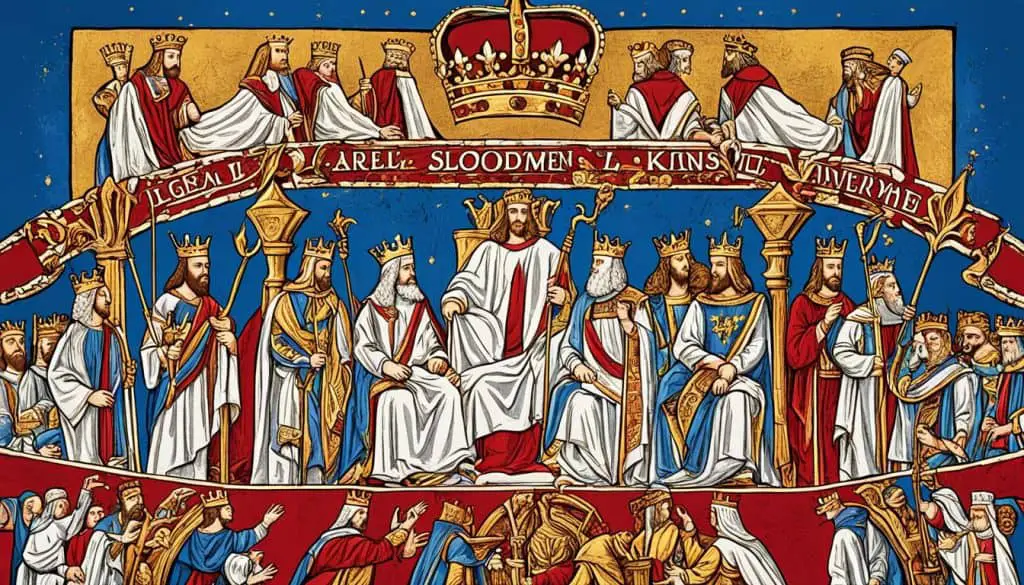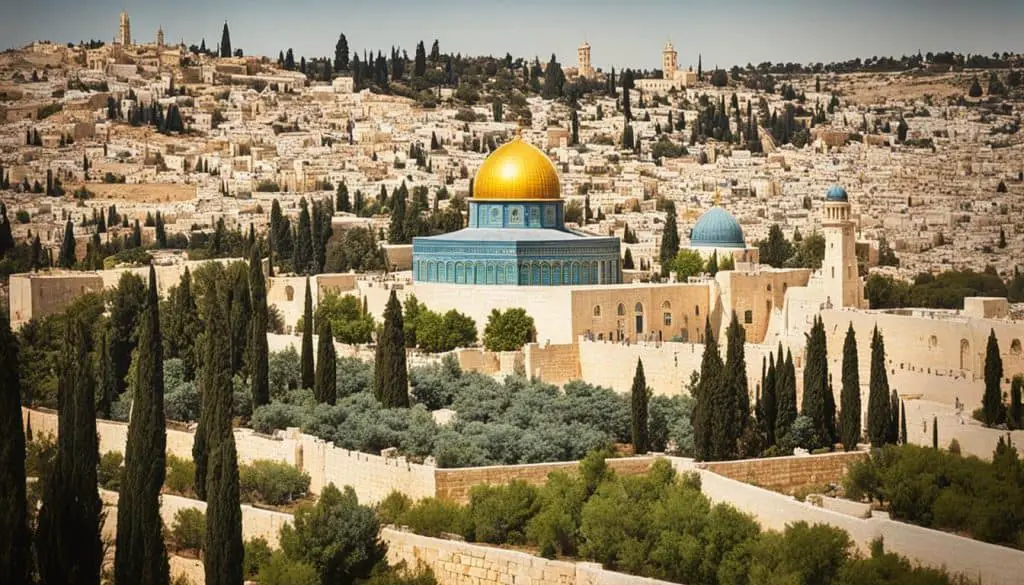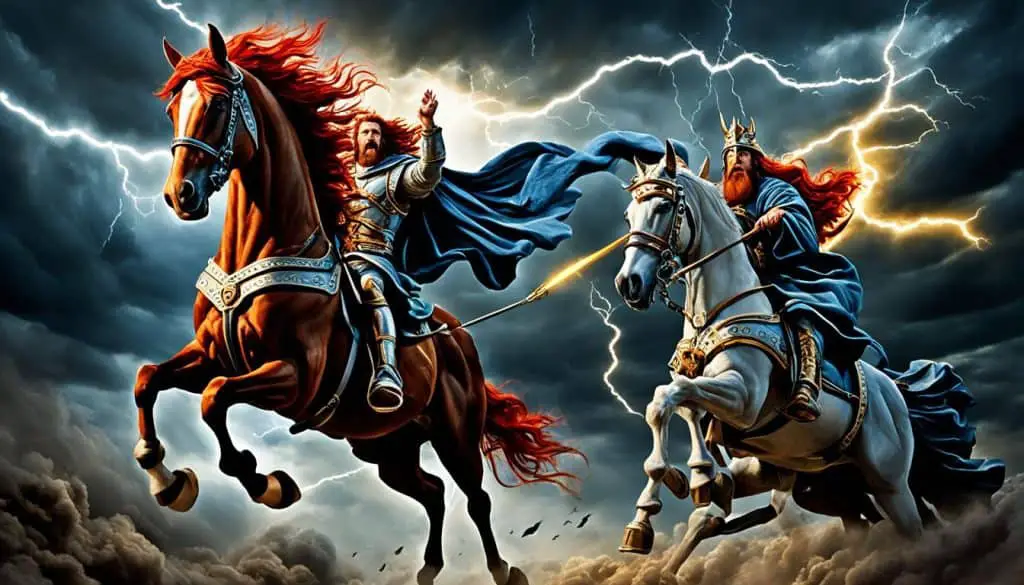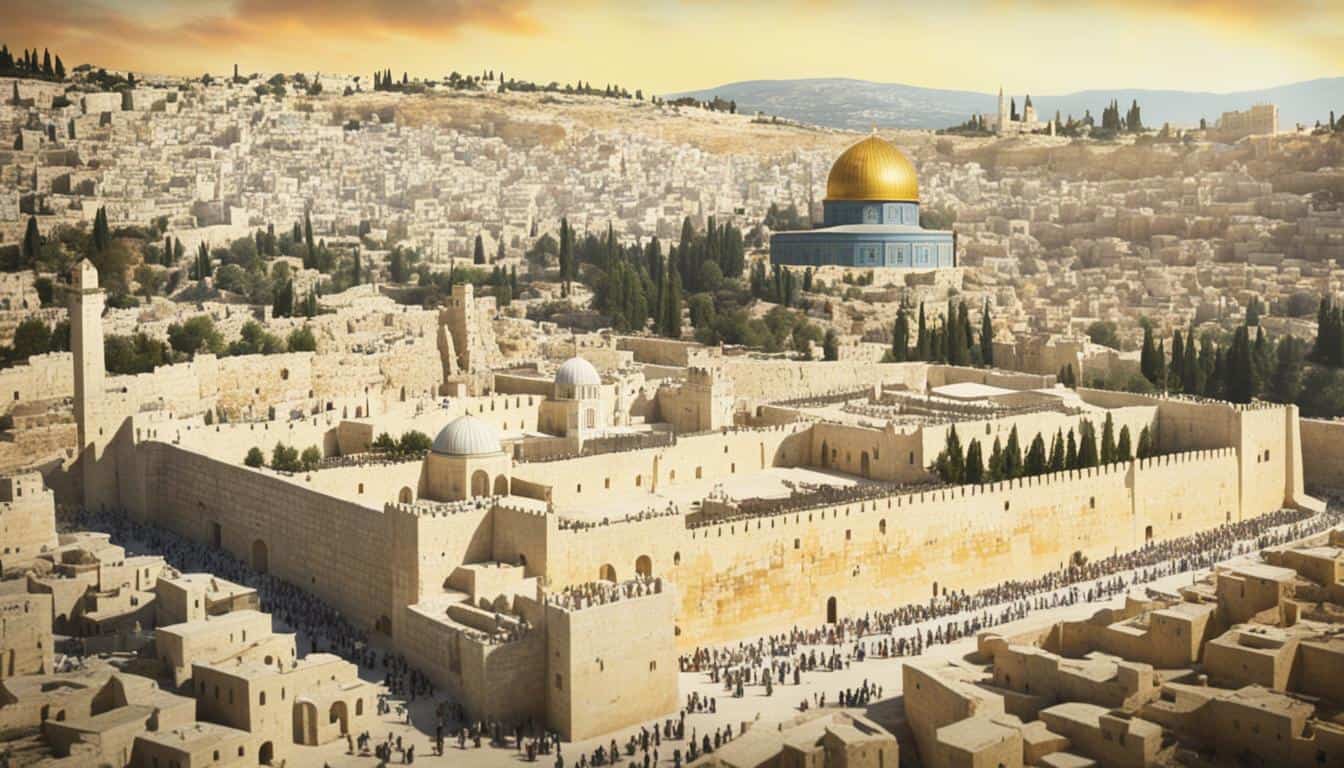Table of Contents
Ever thought about the link between Jerusalem’s story, hope, and prophecy?
How Zion’s Children’s tales stretch across time and tie to Jesus’s mission?
Dive into a history woven with faith and redemption’s significance.
We’ll dive into the lives of Abraham, Isaac, David, Solomon, and the prophets. Their roles in Jerusalem’s story, the hope and prophecy they bring, and how they influence Jesus’s mission will be explored.
Ready to uncover the hidden connections in Zion’s Children’s stories?
Join us to challenge your views, deepen your understanding, and discover truths that will enrich your faith.
The Genesis Connection: Abraham’s Sacrifice on Mount Moriah
The story of Abraham’s sacrifice on Mount Moriah is a key moment in the Bible. It shows deep meaning and foretells Jesus’ ultimate sacrifice. This event is often called the Genesis connection.
Abraham, the father of faith, showed great obedience when God told him to sacrifice his son, Isaac. Heading to Mount Moriah, Abraham’s strong faith led him, despite his deep emotional struggle.
“Take now thy son, thine only son Isaac, whom thou lovest, and get thee into the land of Moriah; and offer him there for a burnt offering upon one of the mountains which I will tell thee of.” – Genesis 22:2
Abraham’s deep test and sacrifice link to God’s plan for saving humanity. The similarities between Abraham’s act and God’s sacrifice of Jesus are clear.
Like Isaac carried the wood for his sacrifice, Jesus carried his cross. Both sacrifices happened on mountains, highlighting their importance.
The link between Abraham’s sacrifice and Jesus’ on the cross shows God’s great love. It hints at a bigger sacrifice. Jesus, the promised son, would die for our sins.
Thinking about this connection reminds us of God’s love and grace. Jesus’ sacrifice brings us forgiveness, redemption, and eternal life.
| Abraham’s Sacrifice on Mount Moriah | Jesus’ Sacrifice on the Cross |
|---|---|
| Testing of faith | Ultimate test of love and obedience |
| Willingness to sacrifice beloved son | God’s sacrifice of His Son for humanity |
| Mount Moriah as the location | Mount Calvary as the location |
| Carrying the wood for the sacrifice | Carrying the cross |
| Prefiguring the redemption of humanity | Providing forgiveness, redemption, and eternal life |
Exploring the Bible reveals more ties and insights that show God’s faithfulness and redemption plan. The connection from Abraham’s sacrifice to Jesus’ cross points to God’s endless love and His work in our lives.
Isaac’s Near-Sacrifice: Foreshadowing Christ’s Offering
Isaac and Christ: A Tale of Sacrifice and Redemption
Let’s look at Isaac’s near-sacrifice, a key story from Jerusalem’s Bible. This event is a preview of Christ’s sacrifice on the cross. Isaac’s choice to listen to his father mirrors Christ’s decision to follow God’s will, aiming to save us all.
Examining Isaac and Christ’s sacrifices shows us how they connect. It helps us understand redemption’s divine plan as shown in the Bible.
The Faithful Son and the Son of God
Isaac’s story highlights Abraham’s strong faith in God. On the way to Mount Moriah, Isaac carried the wood, not knowing he was the intended sacrifice. Like Isaac, Jesus carried His own cross, showing His readiness to obey God.
Both Isaac and Jesus demonstrated deep faith. Isaac agreed to his near-sacrifice, pointing ahead to Jesus’ sacrifice for our sins.
A Glimpse of the Divine Plan
Isaac’s near-sacrifice is a clear clue to God’s redemption plan. Isaac was spared thanks to a ram provided by God. Similarly, Jesus’ death allows us to be forgiven for our sins.
Isaac’s story in Jerusalem highlights God’s love and the big plan shown through Jesus. It teaches us to trust in God’s grace, guiding us through life’s surprises.
“For God so loved the world that He gave His only begotten Son, that whoever believes in Him should not perish but have everlasting life.” – John 3:16 (KJV)
David’s Royal Lineage: A Promise of an Everlasting Throne
King David is a standout figure in Jerusalem’s biblical tales. He went from a humble shepherd to the king of Israel. His relationship with God and making Jerusalem the capital laid a base for a lasting throne promise.
David’s tale starts with a simple family. He was Jesse’s youngest son, a shepherd. Yet, Samuel, the prophet, chose him as Israel’s future king. This choice marked David’s life with God’s favor.
As king, David took Israel to great heights. He made Jerusalem the heart of the nation by defeating the Jebusites. His reign brought peace and unity, making him a symbol of hope.
David’s importance goes beyond his time on earth. God promised him an eternal dynasty in 2 Samuel 7:16. It said, “Your house and your kingdom will always stand before me. Your throne will be forever.”
This eternal throne promise points to Jesus Christ, a descendant of David. Jesus’ life, death, and resurrection created a kingdom beyond time. This kingdom brings real salvation to anyone who believes.
In the New Testament, Jesus is called the “Son of David”. This links him to David’s throne and God’s promise. Jesus starts a kingdom that will never end.
“I Jesus have sent mine angel to testify unto you these things in the churches. I am the root and the offspring of David, and the bright and morning star.” – Revelation 22:16
David’s Royal Lineage
| Name | Relation to David |
|---|---|
| Jesse | Father |
| King David | Self |
| King Solomon | Son |
| Rehoboam | Grandson |
| Abijah | Great-grandson |
| Asa | Great-great-grandson |
| Jehoshaphat | Great-great-great-grandson |
| Jehoram | Great-great-great-great-grandson |
| Uzziah | Great-great-great-great-great-grandson |
| Jotham | Great-great-great-great-great-great-grandson |
| Ahaz | Great-great-great-great-great-great-great-grandson |
| Hezekiah | Great-great-great-great-great-great-great-great-grandson |
| Manasseh | Great-great-great-great-great-great-great-great-great-grandson |
| Amon | Great-great-great-great-great-great-great-great-great-great-grandson |
| Josiah | Great-great-great-great-great-great-great-great-great-great-great-grandson |
David’s royal family shows God’s promise and faithfulness. It reminds us that Jesus, David’s heir, offers eternal salvation to believers. Reflecting on David’s legacy, let’s accept Jesus as our King and cherish the endless throne promise.

Solomon’s Temple: A Shadow of the True Temple to Come
Looking at Solomon’s Temple, we see it as a hint of the true temple that was to arrive. This future temple would eclipse all earthly beauty. It would become God’s home. King Solomon’s creation stood for God’s presence with His people. It also hinted at Jesus, the real temple.
Building Solomon’s Temple was remarkable. It showed off the Israelites’ skill and devotion. Covered in gold, precious stones, and fine designs, the temple shined with God’s glory. Yet, this grand building was just a glimpse of what was to come.
In the New Testament, Jesus said, “Destroy this temple, and in three days I will raise it up” (John 2:19, KJV). He meant His body. He spoke of His death and resurrection. This event would complete what Solomon’s Temple started. Jesus, as the true temple, would be where God lives with us.
Jesus did what the old temple couldn’t. He opened a way for everyone to be with God. He removed sin’s barriers. Because of Jesus, we can be close to God. The real temple, Jesus, gives hope, forgiveness, and life forever to believers.
“For in him dwelleth all the fulness of the Godhead bodily.” – Colossians 2:9 (KJV)
The image below shows Solomon’s Temple. It highlights its beauty and structure.
The story of Solomon’s Temple teaches us about Jesus, the true temple. Through Him, we get real salvation and see God’s promises come true. Let’s focus on Jesus, where God fully lives. In Him, we feel God’s grace and love fully.
Isaiah’s Virgin Birth Prophecy: A Sign to All Generations
In the book of Isaiah, a prophecy stands out. It shines a light on Jesus’ virgin birth. This amazing sign speaks about Jesus being our Savior. It brings hope for everyone.
“Therefore the Lord himself shall give you a sign; Behold, a virgin shall conceive, and bear a son, and shall call his name Immanuel.” – Isaiah 7:14
This prophecy was made long before Jesus was born. It tells of a virgin mother and her son, Immanuel, meaning “God with us.” This event shows Jesus’ divine nature.
Jesus’ birth is key to understanding his mission as the Savior. Born from a virgin, Jesus was both man and divine. This unique birth set him apart from anyone else.
Jesus connected humanity with God through his birth. He lived as we do, but he also had God’s eternal nature. This helped him save us and fix our relationship with God.
Jesus’ Nature and Mission
To grasp the full meaning of Isaiah’s prophecy, we must understand who Jesus is. As God’s Son, he came to show God’s love. He made a way for us to be right with God again.
Jesus came to save the lost, as he said in Luke 19:10. His aim was to offer salvation by dying and coming back to life.
Jesus showed he was divine by performing miracles and showing compassion. He healed people, brought the dead back to life, and fought demons.
Jesus aimed to change hearts, not just situations. He taught about love, forgiveness, and living by God’s rules. His main goal was to fix our bond with God and promise eternal life through faith.

Isaiah’s prophecy about the virgin birth highlights Jesus’ divine mission. It shows God’s love and his plan for our salvation. This prophecy is a sign of hope for all of us.
Jesus’ birth reminds us that God is always with us. It offers us hope and a chance for redemption. Let’s remember the love God has for us and the great lengths he went to save us.
Jeremiah’s New Covenant: A Heartfelt Promise to Zion’s Children
In Jerusalem, Jeremiah’s prophecy of a new covenant is highly important. It perfectly matches Jesus’ mission, who aimed to complete the law and save believers.
Jeremiah talked about a new kind of covenant. Unlike the old one on stone tablets, this would be in people’s hearts. It would deeply change their lives, echoing Jesus’ message about inner change and the Holy Spirit.
This prophecy gives hope and comfort to Zion’s Children. It promises them God’s return and a new beginning. Jesus made this new covenant real through His death and rising, offering redemption.
“I will put my law in their inward parts, and write it in their hearts; and will be their God, and they shall be my people.” – Jeremiah 31:33

The Fulfillment of Prophecy
Jesus came to Earth with a big mission. He wanted to share good news, do miracles, and fulfill prophecies like Jeremiah’s. His death created a new bond with humanity, bringing us closer to God.
Accepting Jesus means we get forgiveness and eternal life. His new covenant shows God’s kindness, offering mercy to believers. It transforms us and fixes our relationship with God.
A Heartfelt Promise
The new covenant is more than a deal; it’s God’s loving promise. It shows His endless love and wish to be in His followers’ hearts. It brings hope, healing, and a fresh start for those who want a deeper bond with God.
As Zion’s Children, we’re lucky to live under Jesus’ new covenant. It invites us to let the Holy Spirit change and guide us. It helps us follow God’s plan for us.
“And I will give them one heart, and I will put a new spirit within you; and I will take the stony heart out of their flesh, and will give them an heart of flesh.” – Ezekiel 11:19
Jeremiah’s new covenant reminds us of God’s loyalty and His strong promise to us. It encourages us to have a real bond with Jesus, accepting the new heart and spirit He gives.
Ezekiel’s Vision of the Valley of Dry Bones: Resurrection and Life
Ezekiel’s vision in Jerusalem is deeply meaningful. It symbolizes Jesus’ control over life and death. The scene is a valley of dry bones, showing Israel’s state of spiritual despair.
God told Ezekiel to speak to these bones. He said He would make them live again. Suddenly, the bones came together, grew flesh, and were filled with life. This miracle showed God’s promise to restore Israel, showcasing His power to revive the dead.
“Thus says the Lord God: Behold, I will open your graves and raise you from your graves, O my people. And I will bring you into the land of Israel. And you shall know that I am the Lord, when I open your graves, and raise you from your graves, O my people. And I will put my Spirit within you, and you shall live, and I will place you in your own land.”
This vision also hinted at Jesus’ mastery over death. Like Ezekiel’s prophecy, Jesus offers everyone eternal life through His resurrection.
Jesus showed He could beat death when He resurrected Lazarus. He confirmed it by rising after His crucifixion. His resurrection means we can all have hope in eternal life if we believe in Him.
Thinking about Ezekiel’s vision lets us see Jesus’ power to renewus. Just as God revived the dry bones, He brings our spirits to life. This transformation fills our lives with His overflowing presence.

The Restoration of Israel
Ezekiel’s vision not only talks about Israel’s revival but also its future prosperity. God promised to unite the bones, signaling the rebirth of the nation. He also pledged to rejuvenate Jerusalem, honoring His promise to His people.
Thanks to Jesus, Jerusalem and its inhabitants will be fully renewed. The emptiness shown by the dry bones will give way to hope, life, and God’s closeness.
The vision reinforces Jesus’ victory over death, offering us the hope of resurrection and unending life. May this assurance fill us with wonder and thankfulness for Jesus, our source of life.
Daniel’s Son of Man: A Heavenly King Arising from Jerusalem’s Prophets
We see a strong link between Jerusalem’s biblical stories and Christ. Now, let’s look at Daniel’s vision of the Son of Man. This vision shows us Jesus’s role. He is a heavenly king born from the prophets of Jerusalem.
In Daniel’s book, the Son of Man is vividly depicted. Daniel sees “one like the Son of Man coming with the clouds of heaven” (Daniel 7:13, KJV). This figure is given power, glory, and a kingdom that lasts forever. This shows he is the eternal king.
“I saw in the night visions, and, behold, one like the Son of Man came with the clouds of heaven, and came to the Ancient of days, and they brought him near before him. And there was given him dominion, and glory, and a kingdom, that all people, nations, and languages, should serve him: his dominion is an everlasting dominion, which shall not pass away, and his kingdom that which shall not be destroyed.” – Daniel 7:13-14 (KJV)
Daniel’s vision helps us understand Christ as the heavenly Son of Man. He goes beyond earthly limits. Jesus is a divine king with supernatural origins. He fulfills the prophecies given by Jerusalem’s prophets.
The vision also highlights the Son of Man’s mission. Jesus, as a heavenly king, aims to create a kingdom without physical or temporary boundaries. He brings salvation, redemption, and eternal life to all believers.
The Son of Man in Daniel’s vision stands for Jerusalem’s prophetic tradition. From Abraham to David, Solomon to Isaiah, Jesus Christ brings together Zion’s narrative. He fulfills the hope and prophecy of Jerusalem.

The Dominion and Glory of the Son of Man
Daniel’s vision shows Jesus’s power and honor. As a heavenly king from Jerusalem’s prophets, he gets authority and respect beyond any earthy leader.
His dominion isn’t just for a time or place. It’s forever, showing Jesus’s kingship is eternal. With his divine power, Jesus welcomes everyone, no matter where they’re from, to serve him and enjoy his kingdom’s blessings.
| Key Aspects of Daniel’s Son of Man Vision | Implications for Christ’s Identity and Mission |
|---|---|
| Coming with the clouds of heaven | Divine nature and origin of Jesus |
| Given dominion, glory, and an everlasting kingdom | Jesus’ authority as an eternal king |
| All people, nations, and languages serving him | Inclusive invitation to join the kingdom |
| Everlasting dominion and indestructible kingdom | Eternal nature of Jesus’ rule |
Daniel’s vision gives us a better look at the heavenly side of Christ’s rule. This king, born from Jerusalem’s prophets, holds power and honor beyond this world. He changes the lives of those who accept his message and follow him.
Haggai’s Call to Rebuild: Foreshadowing the Rebuilding of Humanity through Christ
Haggai plays a key role in Jerusalem’s history and our faith. His call to rebuild the temple is about more than just bricks. It points us to Jesus’ mission to fix our spiritual ‘homes’.
After the Babylonian exile, Jerusalem’s people had to rebuild their temple. Haggai, as God’s voice, urged them to make this task a priority. This sparked hope and drive in everyone’s hearts.
The Power of Haggai’s Call
“Go up to the mountain, bring wood, and build the temple, that I may take pleasure in it and be glorified,” said the Lord through Haggai
Haggai’s message goes deeper than just building. It mirrors Jesus’ goal to bring us back to God’s kingdom. Like the temple showed God’s presence, Jesus lets God’s Spirit live in us.
By following Haggai’s directions, Jerusalem’s people helped set the stage for Jesus. When we follow Jesus, we too can change the world with His love.
Jesus’ Work of Restoration
Jesus did more than fix an old building. Through everything He did, He mended our bond with God. He’s the foundation of our spiritual ‘homes’.
In John’s Gospel, Jesus calls His own body a temple. This hints at His sacrifice and shows us a new way to connect with God. Jesus fixes our broken pieces with His love and mercy.
Thinking about Haggai and Jesus, we’re invited to join this makeover. Letting Jesus work in us, we become part of His big plan for healing the world.

| Comparing Haggai’s Call and Jesus’ Work | Haggai’s Call to Rebuild | Jesus’ Work in Restoring Humanity |
|---|---|---|
| The Purpose | To rebuild the physical temple in Jerusalem | To restore humanity’s relationship with God |
| The Goal | Bringing glory to God through the temple | Bringing redemption and renewal to humanity |
| The Means | Physical construction and dedication | Life, death, and resurrection of Jesus |
| The Call | Urging the people to action in rebuilding the temple | Inviting individuals to surrender their lives to Jesus |
| The Result | Rebuilding the temple as a symbol of God’s presence | Restoration of humanity’s relationship with God |
Zechariah’s Branch: Sprouting from David’s Line to Build the Temple Anew
Exploring Jerusalem’s biblical story shows us how it links to Jesus. We focus on Zechariah’s vision of the Branch now. This vision shows a future Branch from David’s family, symbolizing the temple’s restoration and rebuilding.
Zechariah’s vision embodies hope for a new era. Here, God’s presence reconnects with His people. The temple’s building isn’t just about a physical place. It’s also about the spiritual renewal that Christ offers with His mission.
“Behold the man whose name is the Branch; and he shall grow up out of his place, and he shall build the temple of the Lord. Even he shall build the temple of the Lord, and he shall bear the glory, and shall sit and rule upon his throne.”
Zechariah’s prophetic words hint at Christ’s role as the temple’s ultimate Builder. But Christ builds a temple that’s not physical. It’s a spiritual place in believers’ hearts.
The imagery of the Branch connects Jesus to David’s family. It shows Jesus as the promised Messiah. Like a branch grows from its roots, Jesus fulfills the Davidic covenant and starts a new covenant.
Through His death and resurrection, Jesus rebuilds humanity. He embodies God’s presence, bringing hope, forgiveness, and change to believers.
Reflect on Zechariah’s vision to understand the temple’s building in Christ’s mission. This mission brings hope, salvation, and restoration to all who turn to Him.

The Symbolism of the Branch in Zechariah’s Vision
The Branch in Zechariah’s vision stands for temple rebuilding and Jesus Himself. This branch imagery shows growth, life, and new starts.
The Branch from David’s line shows Jesus’ royal heritage and throne claim. As the Branch grows, it fulfills David’s promises. It starts a kingdom that lasts forever.
The Branch also shows Jesus’ divine side and His role as God’s Incarnate Son. Through His sacrifice and resurrection, Jesus handles our sins. He offers us a chance for glory and eternal life.
By sitting on His throne, the Branch shows Jesus’ reign as King of Kings. His rule brings righteousness, justice, and love.
Zechariah’s vision reminds us of Jesus’ mission to build a new temple. This temple isn’t built by hands, but through the hearts and lives of His followers. Embracing Him allows us to be part of the temple He builds. We become a living proof of His transformative power and the hope of salvation for everyone.
Malachi’s Messenger: Preparing the Way in Jerusalem for the Lord
Malachi was a prophet from Jerusalem. He talked about a special messenger who would prepare for Jesus’ arrival. This messenger was John the Baptist, a key figure in Jerusalem. He made the way for Jesus and got people ready to welcome Him.
John the Baptist wore camel’s hair and ate locusts and wild honey. He was in Jerusalem’s wilderness, calling for people to repent. His words made people think about their lives. They felt moved to change and get ready for the Lord.
John was the messenger Malachi spoke about. He baptized Jesus in the Jordan River. This event started Jesus’ mission as the Messiah. John’s obedience to God’s plan was vital. It helped fulfill the prophecy and brought salvation to all.
In Jerusalem, John’s actions showed God’s plan happening. He connected the old prophets with Jesus’ arrival. His call for repentance made people’s hearts ready for the Savior. This set up the big changes that were about to happen.




